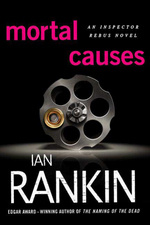 Mortal Causes
Mortal Causes
by Ian Rankin
Series: John Rebus, #6
Hardcover, 310 pg.
Minotaur Books, 1994
Read: July 15 – 18, 2017

When he’d washed his eyes last night, it had been like washing behind them as well. Always it came to this, he tried to do things by the books and ended up cooking them instead. It was easier, that was all. Where would the crime detection rates be without a few shortcuts?
Before Rebus gets to his shortcuts, he’s called to investigate a homicide. A particularly grisly one, reminiscent of some that Rebus saw in Northern Ireland when he was serving there.
It’s his familiarity with that execution that gets him loaned to a special squad also investigating the homicide, especially as it seems tied into some gun smuggling. Rebus isn’t pleased at all to be the new guy — much less, the temporary new guy — on a team, as much as he seems to appreciate some of the individuals on the team (while others make him think more fondly of Chief Inspector Lauderdale). The investigation takes him to Northern Ireland to collect some intelligence, to a dangerous neighborhood, and he brushes up against an American who’s funneling guns of all kinds to (and through) Edinburgh.
In the midst of all of this, Rebus has some drama in his personal life — nothing involving his tenants or brother, but things with Patience Aitken aren’t going as smoothly as one might want (are they ever?) — and there’s another woman who has Rebus in her sights (the guy isn’t a catch, from what I can tell — how does this happen so regularly?).
Throw in an appearance by Big Ger Cafferty while the bodies are piling up and you’ve got yourself a story.
I’m not sure why I don’t have much to say about this one. Maybe because we live on this side of the Good Friday Agreement? But that doesn’t seem to ring true. Rebus is Rebus, Clarke is Clarke, Holmes is Holmes, Farmer Watson is off the wagon, but still pushing his bad coffee . . . the new squad ha some interesting characters, but we don’t spend much time with them. There are some great and colorful characters we brush into during the investigation, too. I don’t know. I liked it, but I can’t think of anything to say beyond that.
There’s a lot to commend in this novel, from great lines like: “He’d had wrong hunches before, enough for a convention of the Quasimodo fan club”; to the wide-ranging sources of trouble for Rebus; to the horrible history and equally horrible present behind the crimes — this is a solid and haunting novel. Something about this was a little off, I’m not sure what — at least as I think back on it, it doesn’t seem as fully developed as the last two. But in the moment I was gripped. I’m not saying that this isn’t fine, I just know Rankin can do better.
—–




Read Irresponsibly, but please Comment Responsibly